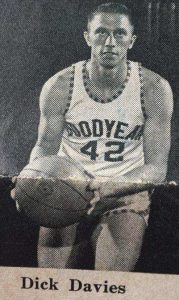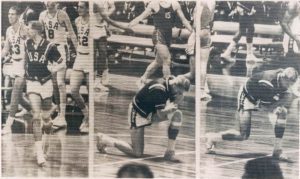The NBA Finals date back to 1947 (when they were known as the Basketball Association of America Finals) and the very 1st NCAA tourney was held in 1939. Olympic basketball competition is even older: it debuted as a demonstration event in 1904 and the men’s version became a medal sport in 1936, with the women finally getting their chance to go for the gold in 1976. The United States has dominated Olympic basketball competition from the start: the men have won 15 gold medals in the 18 tournaments they have participated in during the past 84 years, while the women have won 8 gold medals in the 10 tournaments in which they have competed during the past 44 years. Those of you who were looking forward to the 2020 Olympics opening ceremonies in Tokyo on July 24, 2020 will have to wait an extra 364 days, as the coronavirus caused a postponement until July 23, 2021. Due to the absence of college basketball since mid-March, HoopsHD’s Jon Teitel decided to fill the void by trying to interview as many prior Olympic players/coaches as possible so that you have something to read this summer while not watching the Summer Games. We continue our coverage by chatting with Dick Davies about his father Dick winning an AAU national title and a gold medal in 1964.
Your dad served in the Army during the Korean War: what impact did his service have on him either on or off the court? He was a strict guy with an incredible work ethic so I suppose that was influenced at least somewhat by the Army. He was very proud of his service.
He began his college career at Gettysburg where his brother Bob was the coach: how did he like playing for Bob, and why did he decide to transfer to LSU? They were 16 years apart (the oldest/youngest of 6 kids) and were best friends for most of their adult lives. He held some high school scoring titles in the central Pennsylvania area but was a late bloomer. I know he looked at Seattle where Elgin Baylor played but there were rumors that they might have been going on probation. LSU was another school who was pursuing him and he went there.
In 1960 he was drafted by the St. Louis Hawks and in 1961 Red Auerbach allegedly wanted him to play for the Celtics but he chose to play AAU basketball for the Akron Goodyear Wingfoots: why did he turn down the NBA, and did he have any regrets? The Celtics were in the middle of a dynasty back then and had some incredible guards. My dad tried out for Boston and Red told him that he was the 13th guy so he was not offered a spot on the roster. He probably could have played for St. Louis but he made more money playing for Goodyear. He wanted to play for the Celtics but did not want to jeopardize his amateur status so Red wrote him a letter of recommendation saying that he was quick but needed to work on his shooting. That surprised me because I played H-O-R-S-E against my dad many times…and he never missed!
He won an AAU national championship in 1964: what did it mean to him to win a title? It was on the front cover of the newspaper and was a big deal to Goodyear. They were the greatest name in rubber…and then they became the greatest name in basketball. They played to large crowds and the league was amazingly competitive. He won a big award/medal from Goodyear, which meant a lot to him. When you are a shift foreman in Akron and then receive some awards it means a lot.
He won a gold medal with team USA at the 1964 Olympics: what did it mean to him to represent his country, and what did it mean to him to win a gold medal? It was similar to the Army: he was proud of his service in both instances. When he got to LSU his goal was to get to the Olympics and he was a javelin thrower. He and Shaquille O’Neal are the only LSU basketball players to win a gold medal. He really loved his country so it meant everything to him. Track and field would have been a lower-percentage outcome but the basketball team took care of business in 1964.
Bob was inducted into the Basketball Hall of Fame as a player in 1970 and the following year he was 1 of 10 players named to the NBA’s 25th Anniversary team: was there a little sibling rivalry, or were they just proud of each other’s basketball achievements, or a little of both? They were competitive on the golf course/tennis court but there was no jealousy. If you research Bob’s career he was great at every sport: baseball, marbles, etc. My dad loved his brother: they did not have a lot of money but Bob took care of the family as 1 of the highest-paid basketball players in the world.
After retiring from basketball he went into business and eventually became a vice president for Goodyear: how was he able to follow his on-court success by becoming so successful off the court? My 1st reaction is work ethic: whether he was spreading mulch or playing basketball you could never outwork him. He worked full-time for Goodyear while he played for them and learned the manufacturing business. He had 4 little kids and I do not recall him ever turning down a shift. He was also a winner who knew how to do things the right way: he never drank/smoked and always worked as hard as he could. It was never easy to be in charge of 10 manufacturing plants across the US with 50,000 employees. A lot of his success was due to leadership: if the union went on a wildcat strike he would drive to Tennessee and they would jump on the roof of his car. He could be nice 1 moment and intimidating the next. I do not know which was a bigger accomplishment but I think it might be the off-court success.
In addition to basketball he also ran track at LSU and later won several state championships in his age group as a tennis player: which sport was he best at, and which sport did he enjoy the most? He enjoyed tennis the most and loved to play. If his knees were not so beat up from playing basketball then he would have been even better. I remember him playing rec league basketball games while I was in middle school and he would score EVERY single time down the court! When team USA did not win the gold medal in 1988 he knew that they could not win with defense because the international teams were like robots with seasoned players: you have to be able to shoot. He was in his prime during the Olympics at age 28 with many years of AAU ball under his belt: 20-year old college kids are not in their prime.
He passed away in 2012: when people look back on his career, how do you think that he should be remembered the most? I would go with work ethic/hustle and his ability to be a sponge. He bought in to what his coaches taught him. After they won the gold medal everyone was shaking hands with the Russians. He jogged to the FT line and took a knee to say a prayer (a la Tim Tebow many decades later). He did not do it to get on TV: he just had something more important on his mind than celebrating. Now it is commonplace but I wonder if he was the 1st athlete to ever do that:


